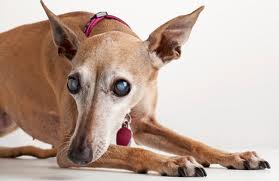Cataracts in dogs occur when the eye’s lens becomes opaque. If left untreated, they can cause blindness. Small cataracts may not affect the vision too much, but they can become bigger over time, which is why frequent monitoring is necessary.
Causes
Cataracts in dogs are mainly caused by genetics, but in some cases, they can be caused by trauma, old age and diseases, especially diabetes. They may occur at a young age or already be present when the dog is born.
Symptoms
The most apparent symptom of cataracts is cloudiness in the eye. The eye may turn a white, blue or grayish color. This is caused by water and protein accumulating in the eye, and signals decreased vision. If you notice your dog squinting, bumping into things or becoming less active, then he may have cataracts. Inflammation and redness in the eye could also signal a cataract.
Diagnosis
A vet can perform an eye exam to determine the cause of the cloudiness in the eye. The vet may order blood tests and additional lab work to see if the cloudiness can be attributed to any chronic diseases, such as diabetes. You will then be referred to an ophthalmologist, who will determine the best course of treatment for your dog.
Treatment
 Although there are some new medicines being used to reduce the amount of protein in the eyes, surgery is typically the most common and effective option. During the surgery, your vet will replace the lens with a plastic or acrylic one. Although your dog will not have perfect vision after surgery, removing the cataract will get it pretty close to normal.
Although there are some new medicines being used to reduce the amount of protein in the eyes, surgery is typically the most common and effective option. During the surgery, your vet will replace the lens with a plastic or acrylic one. Although your dog will not have perfect vision after surgery, removing the cataract will get it pretty close to normal.
The vet will determine if your dog is a good candidate for eye surgery. Not all dogs need the surgery. Cataracts are not painful, and if they are small enough, they will not interfere with vision.
After the surgery, your dog will need to wear a protective collar until the eye heals. He will need to rest and stay in a calm area. He will require eye drops for the next several weeks.
Your vet may recommend that give your dog a vision supplement. One such supplement, Ocu-Glo Rx, is made of 12 antioxidants that support canine eye health.
